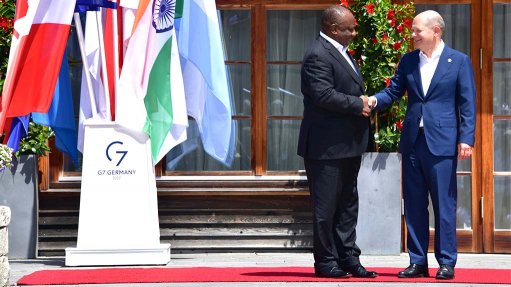
President Cyril Ramaphosa & German Chancellor Olaf Scholz
The Russia-Ukraine conflict could have a silver lining for African countries in the long run, according to President Cyril Ramaphosa, because it forces them to be more self-sufficient as they look to bolster their food supply.
He said African countries faced a similar concern during the Covid-19 pandemic when they had no choice but to manufacture their own vaccines.
The president spoke after he took part in a G7 summit meeting in Germany on Monday.
He said one of the pertinent engagements between the seven members of the G7 and the five invited non-members - South Africa, Argentina, India, Indonesia and Senegal - was around food security in light of the Russia-Ukraine conflict.
Russia invaded Ukraine in February, sparking a deadly war and sending ripples across international food and energy markets.
Ramaphosa said he and Senegal's president, Charles Michel - the current African Union chairperson - "represented the African Union and the continent" at the meeting.
He said they reflected "on the path that we had traversed together with India and many other countries on the issue of the Trade-Related Aspects of Intellectual Property Rights (Trips) waiver to ease access to vaccines for the Global South".
"We argued against the views that were, at the time, expressed by many G7 countries and finally got them to concede that they should be a waiver, and in a way, we were today (Monday) celebrating the success of having achieved a Trips waiver, and they conceded that we had represented the developing economies rather well. We also felt that we should use that as a discussion for further discussions that would take place," Ramaphosa said.
He added that it led to the food security discussions.
"Food prices have gone up, there is a shortage of fertiliser, and the cereals and grains that Russia and Ukraine produce are not getting through; this has led to huge shortages, and prices have gone up for many developing countries," he said.
In light of this, he said the United Nations (UN) secretary-general told leaders at the meeting about the steps the UN was taking to open channels so that goods can begin to be exported to the rest of the world, particularly to African countries.
He added that while the UN's efforts were noble and attendees thought the report was very positive, there was another proposition that countries, particularly those in Africa that are reliant on fertilisers from the two warring countries, should start making an effort to be self-sufficient.
"We are now going to work on a proposal that we hope will be supported by the G7 countries; one or two of them said they would support the proposition to make developing counties on the African continent more self-reliant. So, we are going to work on a proposal similar to the one we worked on with vaccines; we want African countries to be self-sufficient regarding fertiliser production.
"We will be working with the G7 countries to see how we can reach that level; I am particularly pleased and excited about this prospect that we should improve fertiliser production on our continent so that we ensure food security," the president added.